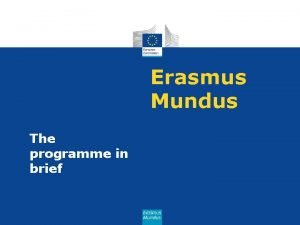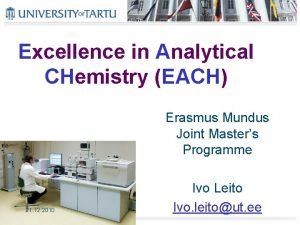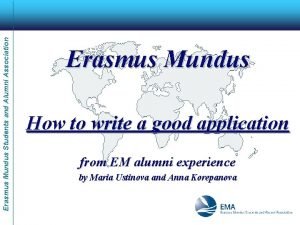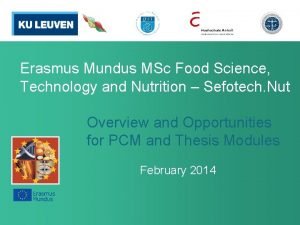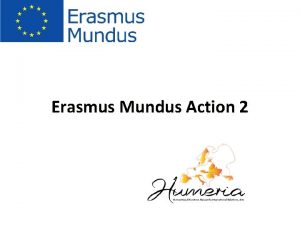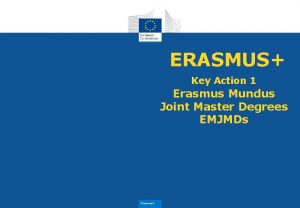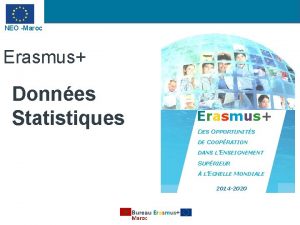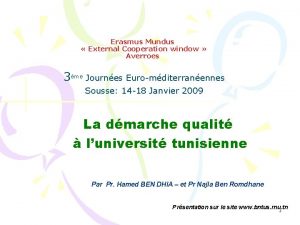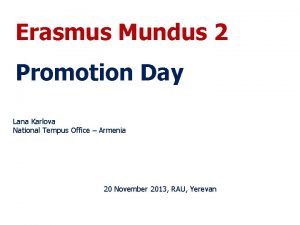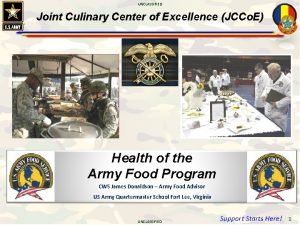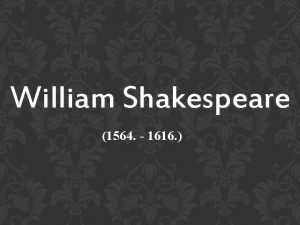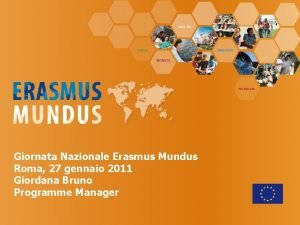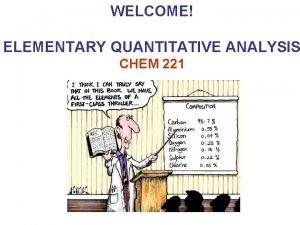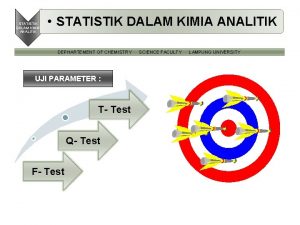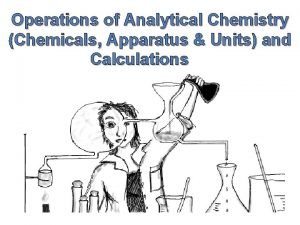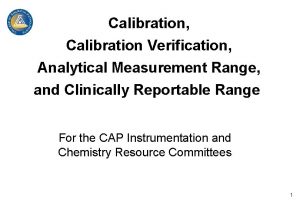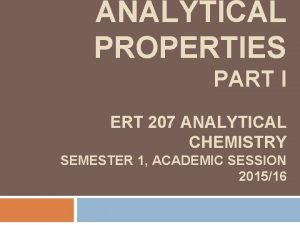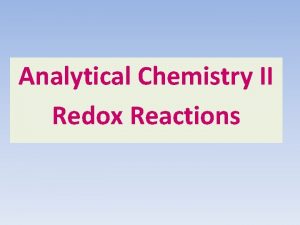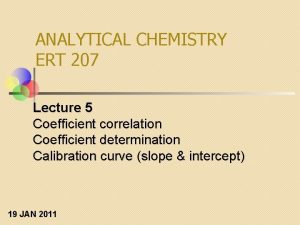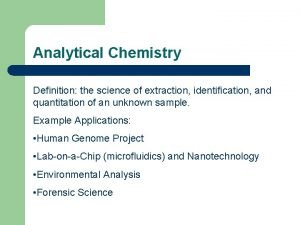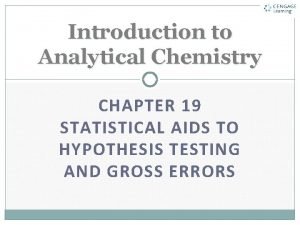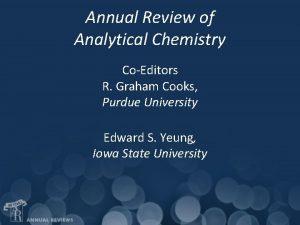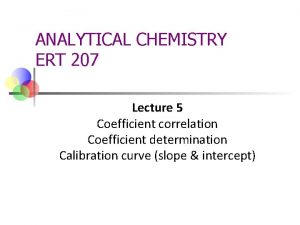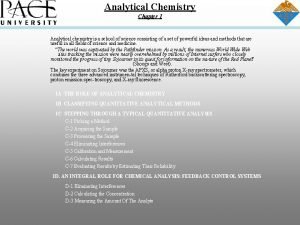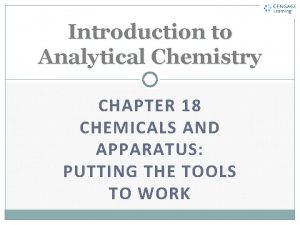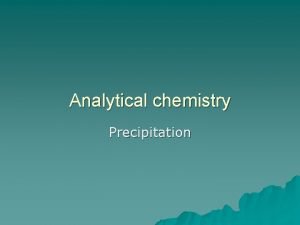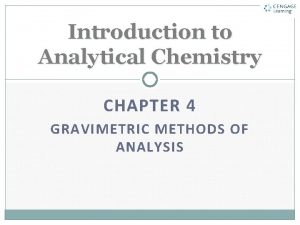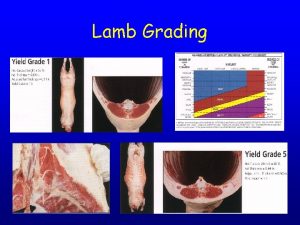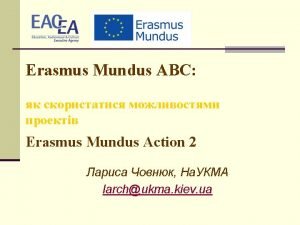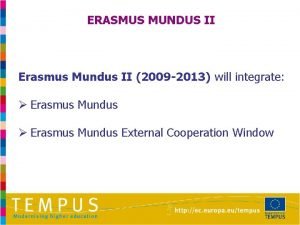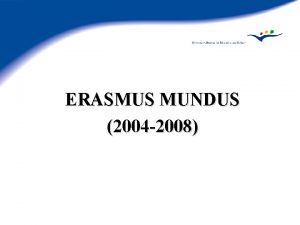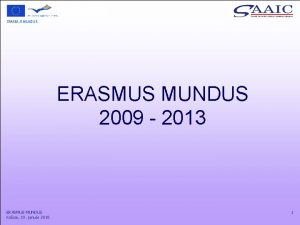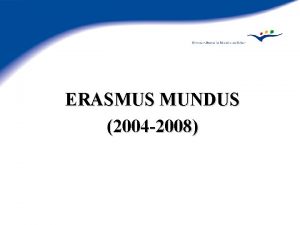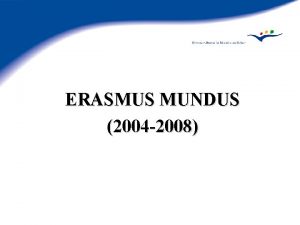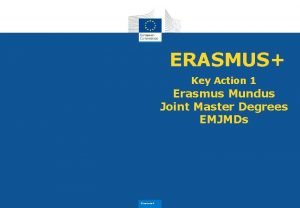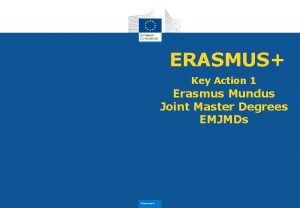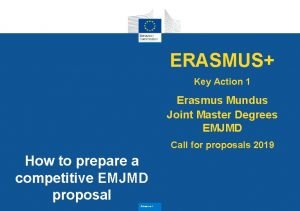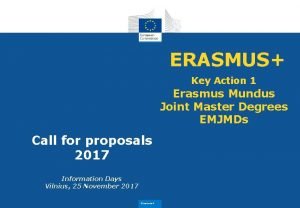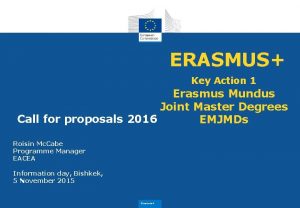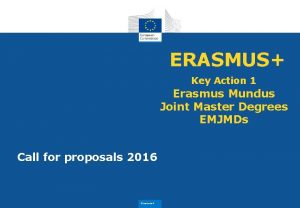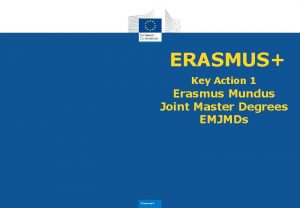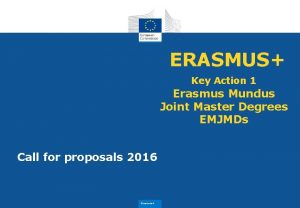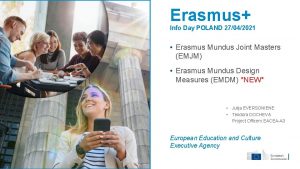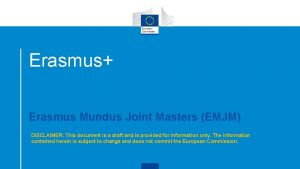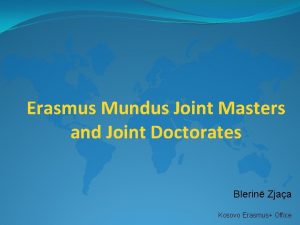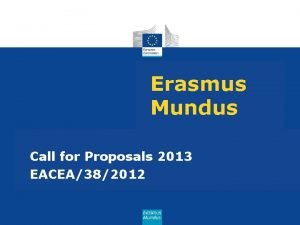Excellence in Analytical CHemistry EACH Erasmus Mundus Joint




































- Slides: 36

Excellence in Analytical CHemistry (EACH) Erasmus Mundus Joint Master’s Programme 21. 12. 2010 Ivo Leito Ivo. leito@ut. ee

This Presentation: • What is Erasmus Mundus? • What are the requirements? • Overview of the current status of the proposal • What needs to be done and agreed for submission • Timing of activities 21. 12. 2010 2

Erasmus Mundus objectives • To enhance the quality of European higher education • To promote the European Union as a centre of excellence in learning around the world • To promote intercultural understanding through cooperation with third countries 21. 12. 2010 3

Actions • Action 1 – Erasmum Mundus joint master’s and doctoral programmes of outstanding academic quality – including scholarship scheme • Action 2 - Partnership between European and third country higher education institutions in specific regions as a basis of structural cooperation, exchange and mobility • Action 3 - measures enhancing the attractiveness of Europe as an educational destination 21. 12. 2010 4

Erasmus Mundus joint master’s programmes (EMMC) • Programmes with duration 60 -120 ECTS • Consortsium includes universities from at least 3 European countries • No priorities in terms of study fields • At graduation joint (preferably) or double degrees awarded • Programmes selected for 5 years • Periods of study in at least 2 institutions of the consortium 21. 12. 2010 5

Successful consortium • Why a joint program? – thorough analysis of strenghts and motivation – Why these universities? This field? This region? – Why mobility? – There has to be a synergy between the partners – The programme has to offer something that is impossible at any one partner – Jointly developed – Preferably with associated partners 21. 12. 2010 6

Educational pathway University of Tartu General analytical chemistry, metrology in chemistry, quality assurance, main analytical techniques Year 1: Fundamentals Uppsala University Advanced separation methods and organic analysis University of Oulu Åbo Akademi University Inorganic and trace element analysis, atomic spectroscopy Sensors, electrochemistry, advanced analytical devices Year 2: Specialization 21. 12. 2010 7

Key persons • UT: Ivo Leito, Ülle Tensing • UU: Jonas Bergquist, Christer Elvingson • UO: Paavo Perämäki, Kimmo Kuortti, Risto Laitinen • AAU: Johan Bobacka, Ari Ivaska, Harriet Klåvus 21. 12. 2010 8

Associate partners • Suomen Ympäristöpalvelu OY • SP Technical Research Institute of Sweden • Tartu Laboratory of the Health Board • Rautaruukki Oy • GE Healthcare AB 21. 12. 2010 9

EACH Modules 21. 12. 2010 10

21. 12. 2010 11

Successful consortium • Coordinators of institutions need very clear understanding of the joint project • Administrative and academic staff of all partener institutions involved – not a “one man show” • Top level support from all institutions • Well designed mobility track for students 21. 12. 2010 12

Consortium agreement Obligatory and covers issues on: Ø joint quality assurance: evaluation of courses (internal) and jointly established defence committe, for example (external) Ø joint admission procedures and requirements Ø degrees awarded Ø financial commitments of the partners 21. 12. 2010 13

Admission of students • Admission to the programme granted on a competitive basis – the applicants are assessed on the basis of students’ academic record • At least 75 ECTS of chemistry studies completed – Good command of the English language is required • Very clear admission procedure is needed 21. 12. 2010 14

EM Scholarships • Category A – For students coming from the third countries • Category B – For students coming from the EU 21. 12. 2010 15

Total for 2 years: € 48 000 € 24 000 (these are maximum amounts) 21. 12. 2010 16

EM Scholarships • Not every student will get a scholarship • The number of scholarships ranges from 17 to 7 per edition – The number decreases from year to year 21. 12. 2010 17

Administrative costs • Financing of the consortium administration: lump sum of € 30 000 per academic year – This amount, together with the “contribution to the EMMC participation costs” forms the EC support to the programme 21. 12. 2010 18

Additional financial commitment • Additional financial commitment of partners is needed – State-financed study places – Meetings, summer/winter schools – Support services for international students – Administration –. . . Most of this can be “in-kind” commitment 21. 12. 2010 19

Administration • Administration of the programme is a large work – At every partner there has to be a dedicated administrative person 21. 12. 2010 20

EACH: financials 21. 12. 2010 21

Documents of the proposal that need your contribution • • Application form Endorsement letter Award criteria Annexes – Programme layout – Model consortium agreement – Model student agreement 21. 12. 2010 22

Application form • • Contact/admin data Short description of the institution Role in the project Other community grants Joint programmes Key people Degree awarded and its recognition status Associate members 21. 12. 2010 23

Endorsement letter • Commitment to – Offering courses – Supervision of master’s theses – Recognition of courses offered by partners – Participating in administration – Financial commitment • Important! 21. 12. 2010 24

Award criteria • • • Details of courses that you offer Admission of students Examinations and grading Financial aspects (study costs, etc) Study administration at AAU Support and services for students and scholars 21. 12. 2010 25

Programme layout • Admission criteria • Details of the course modules that you offer, incl learning outcomes 21. 12. 2010 26

Agreements • See that your data are correct • See that you agree with the contents 21. 12. 2010 27

Important dates • Consortium meeting at Tartu on January 18, 2011 • Financial issues agreed by March 1, 2011 • Supporting documents available by March 15, 2011 • Next submission deadline (probably) on March 31, 2011 21. 12. 2010 28

• • University of Tartu Founded in 1632 9 Faculties 5 Colleges Students: ca 17 000 – ca 750 International • Total staff: 3 500 • Budget: ~100 MEUR • Part of the Estonian NMS – Chemistry, air humidity, air flow 21. 12. 2010 29

Faculties at UT Humaniora Socialia • Faculty of Theology • Faculty of Philosophy • Faculty of Social Sciences and Education • Faculty of Law • Faculty of Economics & Business Administration • Medicina Realia et Naturalia • Faculty of Science & Technology • Faculty of Mathematics & Computer Science 21. 12. 2010 • Faculty of Medicine • Faculty of Exercise & Sport Sciences 30

Faculty of Science and Technology www. lote. ut. ee Institute of Physics Institute of Technology Institute of molecular and cellular biology 21. 12. 2010 Institute of Chemistry Institute of Oecology and geography Marine Institute 31

UT Institute of Chemistry 21. 12. 2010

Institute of Chemistry (IC) • 85 teaching and research staff • 50 ISI publications annually • Postgraduate studies: – 50 Ph. D students, 80 Master students • Testing Centre – ISO 17025 accredited laboratory (pesticide residues, working environment parameters, …) 21. 12. 2010 33

Institute of Chemistry (IC) – Chemistry and electrochemistry of surfaces – Advanced synthesis – Neurochemistry – Computational chemistry and molecular design – Analytical chemistry • • Trace organics (LC-MS) in food, environment, etc Characterization of food Quality and metrology aspects of anal. chem. … 21. 12. 2010 34

Chromatography and Mass spectrometry • Analytes: Pesticides, drug residues, . . . • Matrixes: Food, environmental, … 21. 12. 2010 35

Measurement Science at UT • Part of the Estonian NMS – Chemistry, air humidity, air flow velocity • Pan-European projects and organizations: – 21. 12. 2010 Tracebioactivity, 36
 Erasmus mundus joint doctorates
Erasmus mundus joint doctorates Clivio casali
Clivio casali Excellence in analytical chemistry
Excellence in analytical chemistry Erasmus alumni club
Erasmus alumni club Erasmus mundus scholarship for food technology
Erasmus mundus scholarship for food technology Erasmus mundus action 2
Erasmus mundus action 2 Erasmus mundus list
Erasmus mundus list Erasmus mundus nasıl başvurulur
Erasmus mundus nasıl başvurulur Erasmus mundus maroc
Erasmus mundus maroc Lotus erasmus mundus
Lotus erasmus mundus Atılım üni erasmus
Atılım üni erasmus Erasmus mundus external cooperation window
Erasmus mundus external cooperation window Erasmus mundus action 2
Erasmus mundus action 2 Erasmus mundus armenia
Erasmus mundus armenia Key action 1 erasmus
Key action 1 erasmus Ema
Ema Erasmus +
Erasmus + Joint culinary center of excellence
Joint culinary center of excellence Shakespeare cijeli svijet je pozornica
Shakespeare cijeli svijet je pozornica Mundus roma
Mundus roma Analysis
Analysis Kesalahan dalam analisis kimia
Kesalahan dalam analisis kimia Statistics in analytical chemistry
Statistics in analytical chemistry Macrobalance analytical balance
Macrobalance analytical balance Amr vs crr
Amr vs crr Normal error curve in analytical chemistry
Normal error curve in analytical chemistry Analytical chemistry definition
Analytical chemistry definition Correlation coefficient in analytical chemistry
Correlation coefficient in analytical chemistry Round off rule of 5
Round off rule of 5 Q test in analytical chemistry
Q test in analytical chemistry Annual review of analytical chemistry
Annual review of analytical chemistry Correlation coefficient in analytical chemistry
Correlation coefficient in analytical chemistry Analytical chemistry chapter 1
Analytical chemistry chapter 1 Introduction to analytical chemistry
Introduction to analytical chemistry Analytical chemistry
Analytical chemistry What are the applications of gravimetric analysis
What are the applications of gravimetric analysis A grade lamb
A grade lamb
